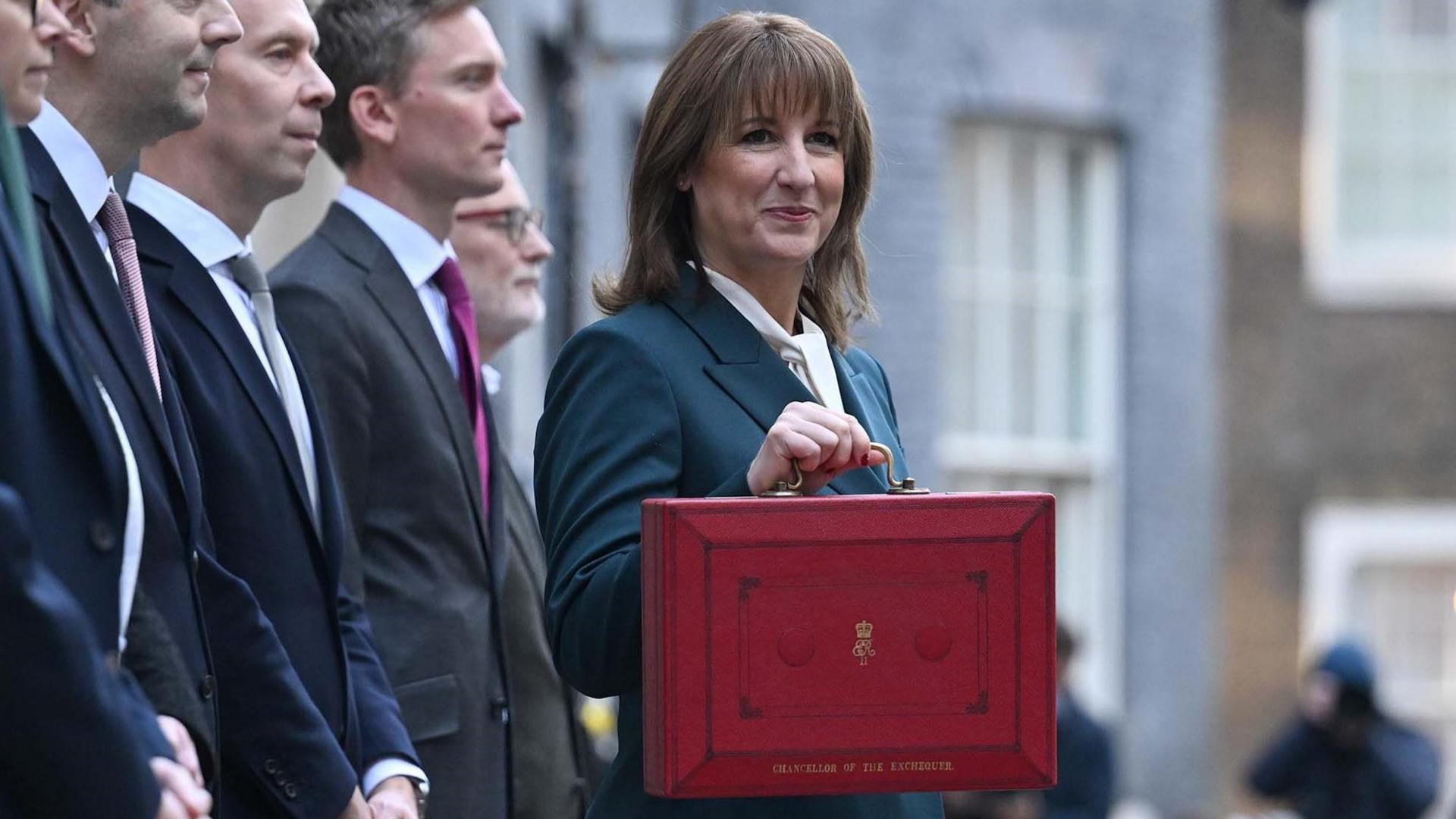Wales to get £500m cash boost from Reeves' Budget

Reeves announced her budget in the House of Commons on Wednesday.
- Published
The chancellor's Budget will see an extra £505m for the Welsh government over next four years, an end to the two-child benefit cap and significant tax rises in years to come.
Welsh ministers will be able to borrow more money to fund services as part of Rachel Reeves' tax and spending package, which will also see the rates that people start paying income tax frozen until April 2031.
Plaid Cymru said the extra money for Wales was "tiny" compared to what has been offered in previous budgets, while the Tories accused the UK government of imposing a "tax bombshell".
First Minister Eluned Morgan said the chancellor's tax and spending plans will "help people right across Wales".
Reform said the Budget will take taxes to post-World War Two highs.
Budget 2025
What the Budget means for you and your money
- Published1 day ago
It comes as ministers in Cardiff are looking for a deal with opposition party members to agree the Welsh government's spending plans for next year.
The UK government said the Welsh government will get an extra £320m to spend on day-to-day services, and £185m on infrastructure, over the course of the next four years.
Treasury figures show most of the additional day to day spending will come over the next two years, £186m in 2026-27 and £113m in 2027-28.
It is a small addition to the £27bn the Welsh government has to work with to fund the NHS, schools and councils in Wales, and is on top to previous planned increases of around £1.6bn per year from June's spending review.
Plaid Cymru said the extra £505m was "not a sign of generosity of Westminster" and was a function of how the existing Barnett formula worked, calling the sums "tiny" compared "to previous Budgets".
The Barnett formula determines how the Welsh government is funded, coming up with a calculation based on what is spent on public services England and Wales' population. An extra £1.7bn was announced for the Welsh government in 2024.
Plaid said Wales' capital budget to spend on roads and other infrastructure was "shrinking" and called on UK ministers to say whether the £185m extra would reverse that.
Finance Secretary Mark Drakeford said the extra cash would "allow us to attend to the many needs we have in Wales", but that the Welsh government's own pot of cash would also rise by £1 billion next year.
The UK Treasury plans to make tweaks to the way the Welsh government is funded, giving them more flexibility in how they manage their own budget.
How much Welsh ministers can borrow and keep in reserves will also be increased, while how much they can take from reserves will be scrapped for 2026/27.
The Treasury says this will give Welsh ministers an extra £425m to spend.
Reeves announced that the two-child benefit cap will be removed from April.
In Wales, 21,610 households claiming universal credit have had a third child or more since the cap was introduced by the previous Conservative government in April 2017.
The state pension will be increased by 4.8% from April 2025, and the minimum wage for workers over 21 will rise by 4.1% from the same time.
Tax changes
A number of tax changes will affect people across Wales.
National Insurance and income tax thresholds will be frozen for an extra three years beyond 2028 - meaning more people will go into higher bands as their wages increase.
The amount that under-65s can put into cash ISAs will be capped at £12,000 a year, with another £8,000 reserved for investments.
Meanwhile the amount that people can sacrifice from their salary to avoid paying national insurance in pension contributions will be capped at £2,000 a year from 2029.
A new mileage-based tax for electric vehicles and plug-in hybrid cars will be introduced from 2028.
A planned council tax surcharge for high value properties will not apply in Wales.
A decision to impose inheritance tax on farming assets worth more than £1m has been controversial among Welsh farmers.
The FUW farming union welcomed a decision to allow the threshold to be shared among spouses, but said many families risk facing unaffordable tax bills.
Meanwhile the UK government said it will work with the Welsh government and private sector to develop plans for the delivery and funding of the Cardiff Parkway proposals.
Analysis
By Gareth Lewis, political editor, BBC Wales
The decision to cut the two-child cap on certain benefits will be welcomed by the Welsh Labour government and Plaid Cymru.
Labour First Minister Eluned Morgan has been pushing for it, keen to show voters she has influence with colleagues in Westminster ahead of the Senedd election next May.
Welsh Labour MPs also back the change.
More than 26,000 Welsh children – who were not eligible for universal credit – now will be.
The Welsh Conservatives think voters are on their side and that taxpayers shouldn't be footing the bill for more generous welfare.
'Weaker fiscal powers'
First Minister Eluned Morgan welcomed the scrapping of the two-child limit.
She said the Budget "will mean more money in the pocket of people who need it the most, support for energy bills, a raise in the minimum wage and good news for pensioners."
Welsh Conservative shadow cabinet secretary for finance, Sam Rowlands, said: "Labour's claim that they wouldn't raise taxes on working people has been exposed for the second Budget in a row, Labour seem to relish spending other people's money.
"Wales and the UK deserve better than a government that leaks its own Budget and punishes the very people who keep our economy running."
A Reform UK Wales spokesperson said: "It's now clear that having Labour governments at both ends of the M4 has been a disaster for Welsh businesses, farms, and communities.
"This Budget will take taxes to post-WW2 highs, putting enormous pressure on employers and employees up and down Wales."
David Chadwick, Liberal Democrat MP, said: "Rural communities have been left abandoned again, with Labour's refusal to compromise on the family farms tax set to cause devastation to the entire wider supply chain."
Related topics
More top stories
- Published1 day ago

- Published1 day ago

- Published2 days ago
